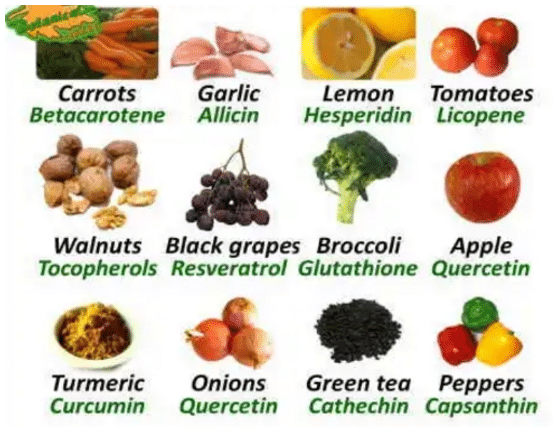It’s common to see the word antioxidants when you read health articles. Usually, nutritionists encourage people to eat fruits that are rich in antioxidants. But what exactly are antioxidants, how do they benefit your health, and what are the best ways to add them to your meals?
Antioxidants are molecules present in the body and found in plant-based foods that counteract oxidative stress. In summary oxidative stress occurs when there is an imbalance between the production of cell-damaging free radicals and the body’s ability to fight their harmful effects. Free radicals form as a byproduct of normal metabolism and in response to exercise, sun exposure, and environmental pollutants like smog and cigarette smoke. The oxidative stress triggered by free radicals damages healthy cells and is believed to play a role in a variety of diseases, including cancer, diabetes, Alzheimer’s disease, Parkinson’s disease, and heart disease. Oxidative stress also negatively affects aging.
Therefore antioxidants essentially serve as security guards to protect healthy cells from free radical attacks. Antioxidants help maintain proper physiological function and protect your health.
There are many, even hundreds, if not thousands, of substances that act as antioxidants, from vitamin C to flavonoids and polyphenols. These antioxidants can be gotten from different plant-based foods. They include berries, cocoa, herbs and spices, beans, artichokes, apples, nuts and seeds, cherries, dark leafy greens, coffee and tea, whole grains, grapes, tomatoes, potatoes and sweet potatoes, avocado, and pomegranate.
Some are of the opinion that you can take antioxidants supplements but they aren’t the best way to protect your body. Some research has linked the use of high-dose beta-carotene supplements to an increased risk of lung cancer in smokers. Taking high-dose supplements of the antioxidant vitamin E has been associated with an increased risk of both hemorrhagic stroke (a type of stroke caused by bleeding in the brain) and prostate. Your option is to consume antioxidants in whole, plant-based foods. This is partly because antioxidants work in synergy with one another and with other bioactive compounds.
In other words, they’re one ingredient in a complex recipe for health protection.
In conclusion, antioxidants are an important aspect of proactive nutrition and may help to fight off aging and chronic disease. For these reasons, they may help you look and feel better. But antioxidants aren’t a cure-all, and they shouldn’t be used in supplement form to treat a medical condition without talking of your doctor.


